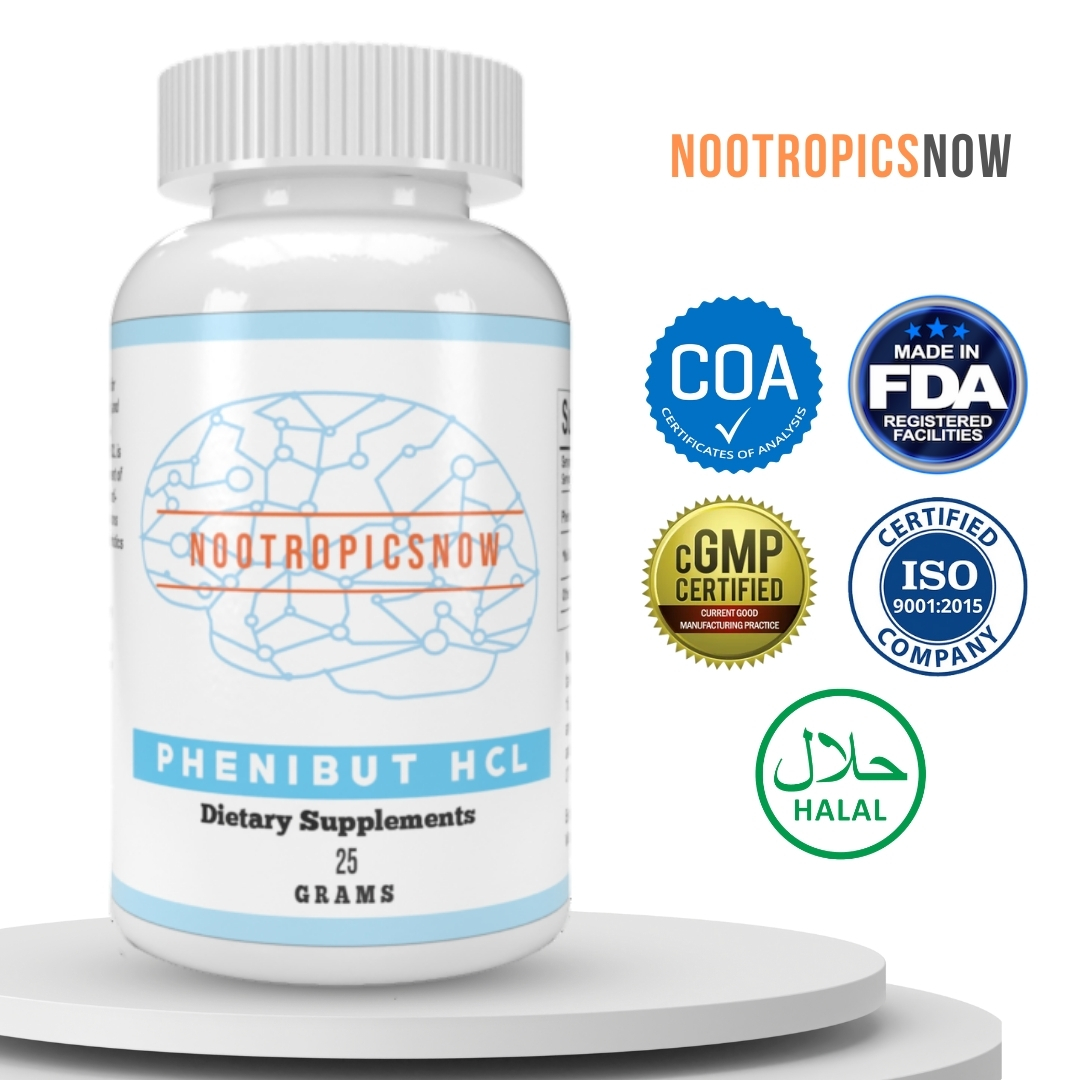Phenibut HCl Capsules: Benefits & Uses

Phenibut HCL Capsules: A Comprehensive Guide
Phenibut HCL capsules have garnered significant attention in recent years. People seek them for their potential anxiolytic and nootropic benefits. However, it’s crucial to understand what Phenibut HCL is, how it works, and what the potential risks and benefits are before considering its use. This comprehensive guide provides in-depth information about Phenibut HCL capsules. We’ll cover everything from their mechanisms of action to their legal status. Furthermore, we will explore responsible usage and potential alternatives.
What is Phenibut HCL?
Phenibut HCL, or β-Phenyl-γ-aminobutyric acid hydrochloride, is a derivative of GABA, a naturally occurring inhibitory neurotransmitter in the brain. GABA plays a crucial role in calming neural activity and reducing anxiety. Phenibut HCL’s chemical structure allows it to cross the blood-brain barrier more easily than GABA itself. This enhances its effects on the central nervous system. As a result, it exhibits anxiolytic, sedative, and nootropic properties.
Because of its unique properties, it interacts with the GABA B receptors, enhancing GABAergic neurotransmission. Additionally, Phenibut HCL affects dopamine levels. This adds to its potential mood-enhancing and cognitive benefits. Its dual action sets it apart from other GABAergic substances. It contributes to its complex effects profile.
How Phenibut HCL Works: Mechanisms of Action
Understanding Phenibut HCL’s mechanisms of action is essential for appreciating its effects. It primarily functions through the following pathways:
GABA B Receptor Agonism: Phenibut HCL acts as a selective agonist of the GABA B receptors. It binds to these receptors. This leads to an increase in the inhibitory effects of GABA. This mechanism contributes to its anxiolytic and muscle-relaxant properties.
Dopaminergic Activity: Phenibut HCL can influence dopamine levels in the brain. It increases dopamine concentrations at low dosages. This increase is correlated with improved mood and cognitive functions.
Calcium Channel Modulation: Phenibut HCL has been shown to interact with voltage-gated calcium channels. This affects the release of neurotransmitters. By modulating calcium channels, Phenibut HCL influences neural excitability and neurotransmission.
Neuromodulatory Effects: In general, Phenibut HCL appears to function as a neuromodulator. This means that, rather than merely influencing receptor pathways, it also changes neurotransmitter activity and release. This may result in wide-ranging effects on mood, stress, cognition, and behavior.
These mechanisms explain how Phenibut HCL exerts its diverse effects on the brain and body. Nevertheless, more research is needed to fully elucidate all the nuances of its interactions.
Potential Benefits of Phenibut HCL Capsules
Users report various potential benefits from using Phenibut HCL capsules. They range from anxiety relief to cognitive enhancement. These reported benefits include:
Anxiety Reduction: Phenibut HCL is primarily known for its anxiolytic effects. It can help reduce anxiety and promote relaxation. This makes it appealing to individuals dealing with stress and social anxiety.

View Product
Improved Sleep: Phenibut HCL can induce sedation and improve sleep quality. It’s often used as a sleep aid to help people fall asleep faster and sleep more soundly.
Enhanced Mood: By affecting dopamine levels, Phenibut HCL has the potential to elevate mood and promote feelings of well-being. This can be helpful for individuals experiencing low mood or mild depression.
Cognitive Enhancement: Some users report improved focus, concentration, and memory while using Phenibut HCL. These cognitive benefits may stem from its neuromodulatory effects on the brain.
Muscle Relaxation: Due to its GABAergic activity, Phenibut HCL can act as a muscle relaxant. This can be beneficial for reducing muscle tension and promoting physical relaxation.
It’s important to note that the effects of Phenibut HCL can vary significantly from person to person. What works for one individual may not work for another.

View Product
Potential Risks and Side Effects
While Phenibut HCL may offer several potential benefits, it also carries certain risks and potential side effects. It is essential to be aware of these before considering using it:
Sedation and Drowsiness: The most common side effect of Phenibut HCL is sedation. Drowsiness is common, especially at higher doses. This can impair cognitive and motor function.
Nausea and Vomiting: Some individuals may experience nausea or vomiting after taking Phenibut HCL. This can be minimized by taking it with food or in smaller doses.
Dizziness and Vertigo: Phenibut HCL can cause dizziness or vertigo in some users. This can be particularly problematic for individuals prone to balance issues.
Rebound Anxiety: Regular use of Phenibut HCL can lead to tolerance. When the substance is discontinued, users can experience rebound anxiety. This can be more severe than their original anxiety levels.
Withdrawal Symptoms: Abruptly stopping Phenibut HCL after prolonged use can trigger withdrawal symptoms, including anxiety, insomnia, agitation, and even seizures. This underscores the importance of tapering off the substance gradually.
Dependence and Addiction: Phenibut HCL has the potential to cause dependence and addiction. Regular users may find it difficult to stop using the substance. They may experience withdrawal symptoms if they try to do so.
Interactions with Other Substances: Phenibut HCL can interact with other substances, especially CNS depressants like alcohol, benzodiazepines, and opioids. Combining Phenibut HCL with these substances can increase the risk of overdose and respiratory depression.
Cognitive Impairment: Paradoxically, despite being promoted for cognitive enhancement, Phenibut HCL can impair cognitive function in some individuals, especially at higher doses.
Loss of Motor Coordination: Similar to other GABAergics like alcohol and benzodiazepines, Phenibut can impair motor skills and judgment. Activities requiring alertness and physical acuity should be avoided when Phenibut is used.
These risks and side effects highlight the importance of using Phenibut HCL responsibly and under the guidance of a healthcare professional.
Dosage Guidelines
Determining the appropriate dosage of Phenibut HCL is crucial for minimizing risks and maximizing benefits. However, there is no one-size-fits-all dosage recommendation. Individual responses can vary greatly.
Starting Dose: A common starting dose for Phenibut HCL is 250-500mg. This allows users to assess their sensitivity to the substance.
Maximum Dose: It is generally recommended to avoid exceeding 1500mg of Phenibut HCL per day. Higher doses increase the risk of side effects and dependence.
Frequency of Use: Phenibut HCL should not be used daily due to the risk of tolerance and dependence. It’s best to limit use to no more than two to three times per week, with at least a few days between doses.
Timing: Phenibut HCL is typically taken on an empty stomach for faster absorption. It can be taken in the morning or evening, depending on the desired effects.
Individual Factors: Dosage should be adjusted based on individual factors, such as body weight, metabolism, and sensitivity to the substance.
Medical Guidance: Consulting a healthcare professional is essential for determining the appropriate dosage and usage schedule for Phenibut HCL.
Responsible Use of Phenibut HCL Capsules
Responsible use of Phenibut HCL capsules is crucial for minimizing risks and maximizing benefits. Here are some key guidelines:
Consult a Healthcare Professional: Before using Phenibut HCL, it is essential to consult a healthcare professional, especially if you have any underlying health conditions or are taking medications.
Start with a Low Dose: Begin with a low dose and gradually increase it as needed, while carefully monitoring your response.
Limit Frequency of Use: Avoid using Phenibut HCL daily to prevent tolerance, dependence, and withdrawal symptoms.
Avoid Combining with Other Substances: Do not combine Phenibut HCL with alcohol, benzodiazepines, opioids, or other CNS depressants.
Monitor for Side Effects: Pay attention to any side effects you experience while using Phenibut HCL. Stop using it immediately if you experience any adverse reactions.
Taper Off Gradually: If you have been using Phenibut HCL regularly, do not stop abruptly. Taper off the substance gradually to minimize withdrawal symptoms.
Seek Support if Needed: If you find yourself struggling with Phenibut HCL use or experiencing withdrawal symptoms, seek support from a healthcare professional or addiction specialist.
Legal Status and Availability
The legal status of Phenibut HCL varies from country to country. In the United States, Phenibut HCL is not approved for medical use by the FDA. It is sold as a dietary supplement. This means that it is not subject to the same regulations as prescription medications.
In some countries, such as Australia, Phenibut HCL is a controlled substance due to concerns about its addictive potential.
Phenibut HCL capsules are widely available for purchase online from various vendors. However, it is essential to purchase them from reputable sources to ensure quality and safety.
Due to its unregulated status in many regions, it can be difficult to verify the purity and potency of Phenibut HCL products. It is imperative to conduct thorough research on suppliers and read user reviews before making a purchase.
Alternatives to Phenibut HCL Capsules
If you are considering using Phenibut HCL capsules, it may be helpful to explore alternative options that may offer similar benefits with fewer risks. Some potential alternatives include:
L-Theanine: An amino acid found in green tea that promotes relaxation and reduces anxiety without causing sedation.

View Product
Magnesium: An essential mineral that plays a role in muscle relaxation and nerve function. Magnesium supplements may help reduce anxiety and improve sleep.
Valerian Root: An herb that has been traditionally used as a sleep aid and anxiety reliever.
Chamomile: An herb with calming properties that can promote relaxation and improve sleep.
Mindfulness Meditation: A practice that involves focusing on the present moment and cultivating a sense of calm and awareness.
Cognitive Behavioral Therapy (CBT): A type of therapy that helps individuals identify and change negative thought patterns and behaviors that contribute to anxiety and other mental health issues.
These alternatives may offer a safer and more sustainable approach to managing anxiety and promoting well-being.
User Experiences and Reviews
User experiences with Phenibut HCL capsules vary widely. Some users report significant benefits, such as reduced anxiety, improved sleep, and enhanced mood. Other users report negative side effects, such as sedation, nausea, and withdrawal symptoms.
Reading user reviews and testimonials can provide valuable insights into the potential effects of Phenibut HCL. However, it is important to remember that individual experiences can vary.
It’s important to approach anecdotal evidence with caution. User experiences are not a substitute for scientific evidence and medical advice.
Conclusion
Phenibut HCL capsules may offer potential benefits for anxiety reduction, improved sleep, and enhanced mood. However, they also carry significant risks, including sedation, nausea, dependence, and withdrawal symptoms.

View Product
Responsible use of Phenibut HCL capsules requires careful consideration, medical guidance, and adherence to dosage guidelines. It is essential to weigh the potential benefits against the potential risks before considering using this substance.
Exploring alternative options, such as L-Theanine, magnesium, valerian root, chamomile, mindfulness meditation, and CBT, may offer safer and more sustainable approaches to managing anxiety and promoting well-being.
Phenibut HCL Capsules: Dosage, Benefits, and Risks

Phenibut HCL capsules have garnered attention for their potential anxiolytic, or anxiety-reducing, and nootropic, or cognitive-enhancing, effects. However, understanding the proper dosage, potential benefits, and associated risks is crucial before considering their use. This section delves into a comprehensive overview of Phenibut HCL capsules, providing information to make informed decisions.
Understanding Phenibut HCL
Phenibut, short for Phenyl-Gamma-Aminobutyric Acid, is a derivative of GABA, a naturally occurring neurotransmitter in the brain. GABA plays a significant role in inhibiting neuronal excitability throughout the nervous system. Phenibut HCL (hydrochloride) is the salt form of phenibut, commonly available in capsule form for oral administration. It is synthesized by adding a phenyl group to GABA, which allows it to cross the blood-brain barrier more easily than GABA itself, potentially leading to more pronounced effects on the brain. Consequently, this structural difference enables it to impact cognitive functions and alleviate anxiety.
Benefits of Phenibut HCL Capsules
While research on Phenibut HCL is limited, anecdotal evidence and some studies suggest several potential benefits, including:
Anxiety Reduction: Phenibut’s primary use is as an anxiolytic, potentially reducing feelings of anxiety and stress. By acting as a GABA B receptor agonist, it may promote relaxation and calmness. Many individuals find it particularly helpful in managing social anxiety.

View Product
Improved Sleep: Phenibut may promote relaxation and improve sleep quality, particularly for individuals struggling with insomnia or sleep disturbances related to anxiety. It might help reduce the time it takes to fall asleep and increase the duration of deep, restful sleep.
Cognitive Enhancement: Some users report improved cognitive function, including enhanced focus, memory, and clarity. Phenibut might boost cognitive performance by modulating neurotransmitter activity in the brain. These effects are often subjective and vary widely.
Social Enhancement: Phenibut may reduce social inhibitions and improve sociability, making it easier for individuals to engage in social situations. It potentially boosts confidence and reduces anxiety in social settings.
Muscle Relaxation: The GABAergic effects of Phenibut may contribute to muscle relaxation, potentially easing muscle tension and spasms. This benefit may be helpful for athletes or individuals experiencing muscle-related discomfort.
Dosage Guidelines for Phenibut HCL Capsules
Determining the appropriate dosage of Phenibut HCL capsules can be complex, as individual responses vary considerably. Factors such as body weight, individual sensitivity, and desired effects play a role in determining the ideal dose. Therefore, starting with a low dose and gradually increasing it is crucial to minimize the risk of side effects.
| Dosage Level |
Amount |
Frequency |
Purpose |
| :————— |
:————— |
:——————– |
:—————————————————————————- |
| Microdose |
250mg or less |
Once daily or less |
Mild anxiolytic effect, improved sleep |
| Low Dose |
250mg – 500mg |
Once daily or less |
Moderate anxiety reduction, enhanced mood |
| Moderate Dose |
500mg – 1000mg |
Once daily or less |
Significant anxiety relief, potential cognitive enhancement |
| High Dose |
1000mg+ |
Not Recommended |
Increased risk of side effects, tolerance, and dependence |
Important Considerations:
Start Low: Begin with the lowest effective dose (250mg or less) to assess individual sensitivity.
Frequency: Limit use to no more than two times per week to avoid tolerance and dependence.
Timing: Take Phenibut on an empty stomach for faster absorption, typically 2-3 hours after eating.
Avoid Redosing: Do not take additional doses within the same day.
Hydration: Stay hydrated by drinking plenty of water after taking Phenibut.
Cycling: Consider cycling Phenibut usage by taking breaks to avoid tolerance and dependence.
Medical Advice: Always consult with a healthcare professional before using Phenibut HCL capsules, especially if you have pre-existing medical conditions or are taking other medications.
Risks and Side Effects
While Phenibut HCL capsules offer potential benefits, they also carry potential risks and side effects. Being aware of these risks and taking precautions is essential for safe and responsible use.
Sedation and Drowsiness: Phenibut can cause sedation, drowsiness, and impaired cognitive function. Avoid driving or operating heavy machinery after taking Phenibut HCL capsules.
Nausea: Some users experience nausea, particularly at higher doses. Taking Phenibut with food may help alleviate nausea.
Headache: Headaches are a common side effect, especially when starting Phenibut. Staying hydrated can help reduce headaches.
Tolerance and Dependence: Regular Phenibut use can lead to tolerance, requiring higher doses to achieve the same effects. Dependence can develop, leading to withdrawal symptoms upon discontinuation.
Withdrawal Symptoms: Discontinuing Phenibut after regular use can cause withdrawal symptoms, including anxiety, insomnia, agitation, and, in severe cases, seizures. Gradually tapering the dose is crucial to minimize withdrawal symptoms.
Rebound Anxiety: Anxiety may return worse than baseline after Phenibut wears off, leading to a cycle of use.
Interaction with Other Substances: Phenibut can interact with other CNS depressants, such as alcohol and benzodiazepines, increasing the risk of sedation, respiratory depression, and overdose.
Overdose: Taking excessive doses of Phenibut can lead to overdose, resulting in severe sedation, respiratory depression, coma, and death. Seeking immediate medical attention is essential if an overdose is suspected.
Limited Research: The long-term effects of Phenibut use are poorly understood, and more research is needed.
Legal Status and Availability
The legal status of Phenibut varies widely by country. In the United States, Phenibut is unregulated and can be purchased as a dietary supplement. However, it is not approved by the FDA for any specific medical use. In some countries, such as Australia, Phenibut is a controlled substance due to health concerns.
The availability of Phenibut HCL capsules is primarily through online retailers and supplement stores. However, due to its potential risks, purchasing Phenibut from reputable sources that provide quality products is essential.
How to Mitigate Risks
While Phenibut HCL capsules have potential risks, several strategies can help mitigate these risks and promote safer use.
Educate Yourself: Thoroughly research Phenibut HCL, including its effects, potential side effects, and interactions.
Consult a Healthcare Professional: Talk to your doctor or a qualified healthcare professional before using Phenibut, especially if you have pre-existing medical conditions or are taking other medications.
Start with a Low Dose: Begin with the lowest effective dose to assess your sensitivity.
Limit Frequency of Use: Avoid using Phenibut daily or more than twice per week to prevent tolerance and dependence.
Avoid Combining with Other Substances: Refrain from using Phenibut with alcohol, benzodiazepines, opioids, or other CNS depressants.
Stay Hydrated: Drink plenty of water after taking Phenibut to help minimize headaches and other side effects.
Monitor Your Response: Pay close attention to how Phenibut affects you and discontinue use if you experience adverse effects.
Taper Dosage When Discontinuing: Gradually reduce the dosage of Phenibut when discontinuing use to minimize withdrawal symptoms.
Phenibut HCL Capsules vs. Powder
Phenibut HCL is available in both capsule and powder form. While both forms contain the same active ingredient, there are differences to consider:
| Feature |
Phenibut HCL Capsules |
Phenibut HCL Powder |
| :————- |
:——————————————– |
:——————————————— |
| Convenience |
Pre-measured doses, easy to take on the go |
Requires measuring, less convenient for travel |
| Accuracy |
Precise dosing |
Potential for inaccurate dosing |
| Taste |
Masks the bitter taste of Phenibut |
Bitter taste |
| Cost |
Generally more expensive |
Generally less expensive |
| Availability |
Widely available |
May be less widely available |
Capsules offer convenience and accurate dosing, making them a popular choice for those new to Phenibut. However, the powder form may be more cost-effective for regular users who are comfortable measuring doses. The bitter taste of the powder can be a drawback for some individuals.

View Product
Alternative Options
If the risks associated with Phenibut are concerning, several alternative options are available for managing anxiety and improving sleep:
L-Theanine: An amino acid found in green tea that promotes relaxation without sedation.

View Product
Magnesium: A mineral that plays a crucial role in nerve function and may reduce anxiety and promote sleep.
Melatonin: A hormone that regulates sleep-wake cycles.
Valerian Root: An herbal remedy that has sedative properties and may improve sleep quality.
Chamomile: An herb with calming effects that can promote relaxation and reduce anxiety.
Cognitive Behavioral Therapy (CBT): A type of therapy that helps individuals identify and change negative thought patterns and behaviors that contribute to anxiety and insomnia.
Mindfulness Meditation: A practice that involves focusing on the present moment to reduce stress and improve mental well-being.
These alternatives may offer similar benefits to Phenibut with a lower risk of side effects, tolerance, and dependence.
Conclusion
Phenibut HCL capsules may offer potential benefits for anxiety reduction, improved sleep, and cognitive enhancement. However, they also carry significant risks, including sedation, tolerance, dependence, withdrawal symptoms, and potential interactions with other substances. The potential for side effects and dependence necessitates cautious use, adherence to recommended dosages, and regular consultation with healthcare professionals. Educating yourself, consulting with a healthcare provider, and using Phenibut responsibly are crucial for minimizing risks and maximizing benefits. Always prioritize your health and well-being when considering the use of Phenibut HCL capsules or any other nootropic substance.









